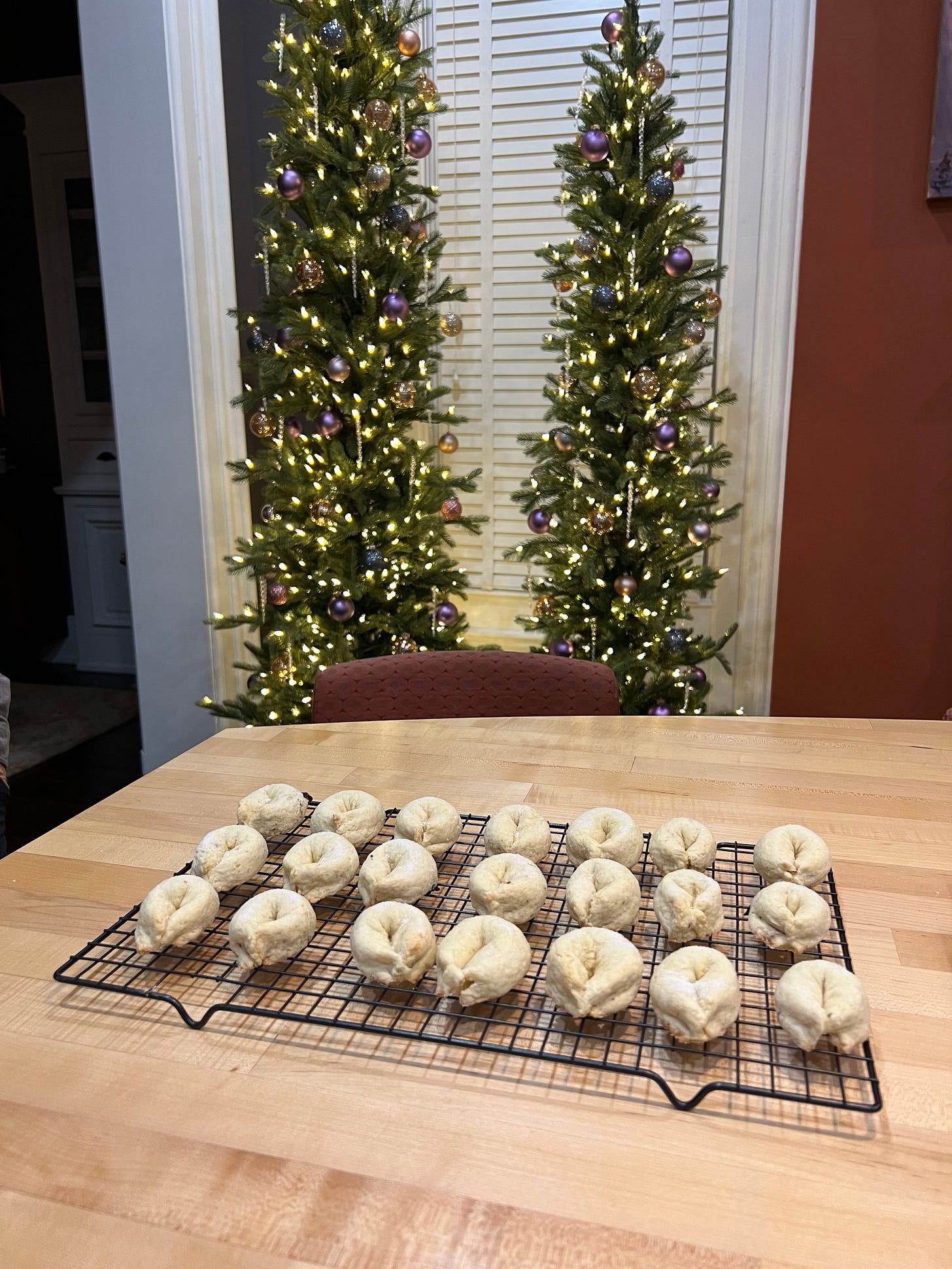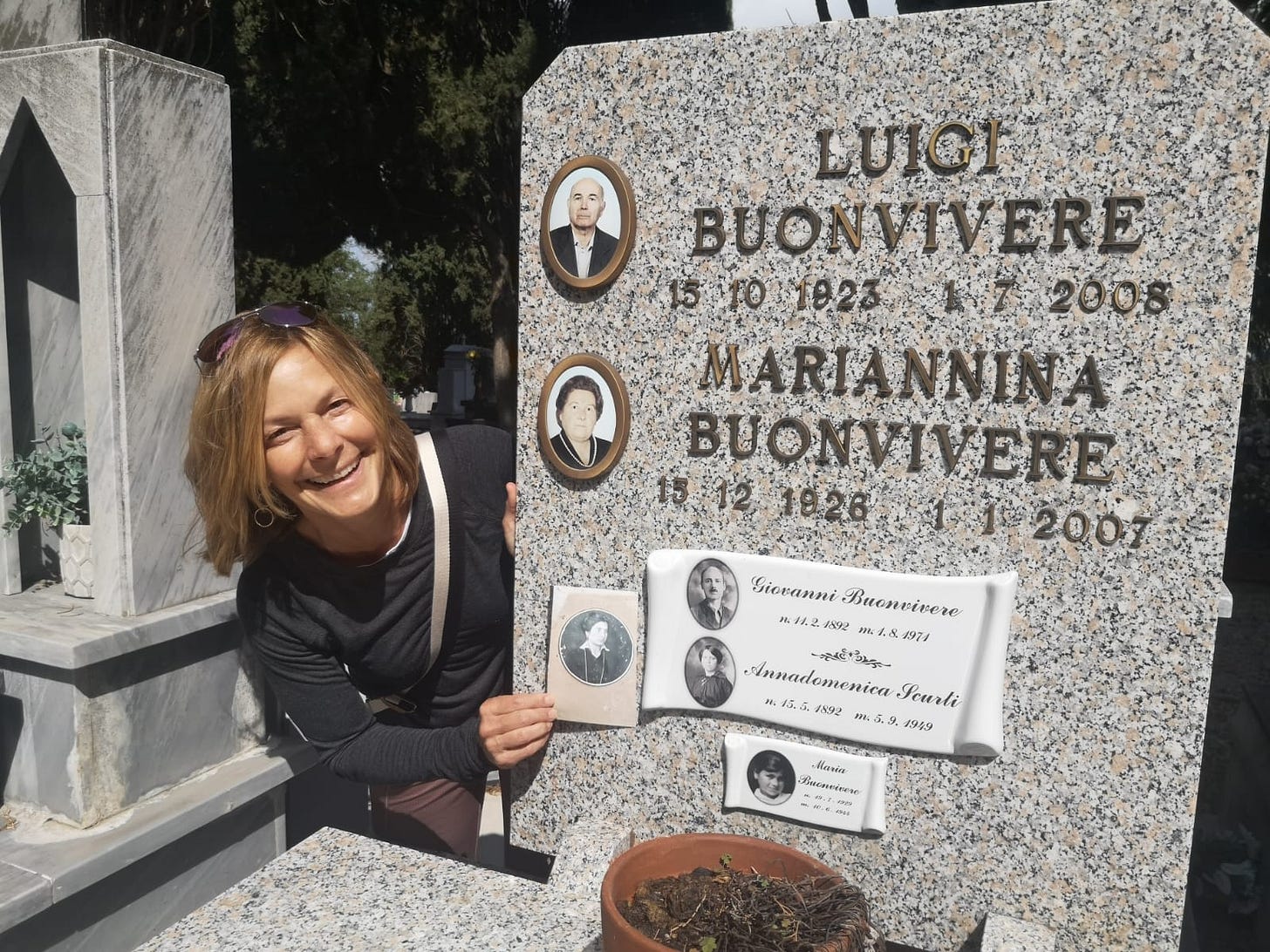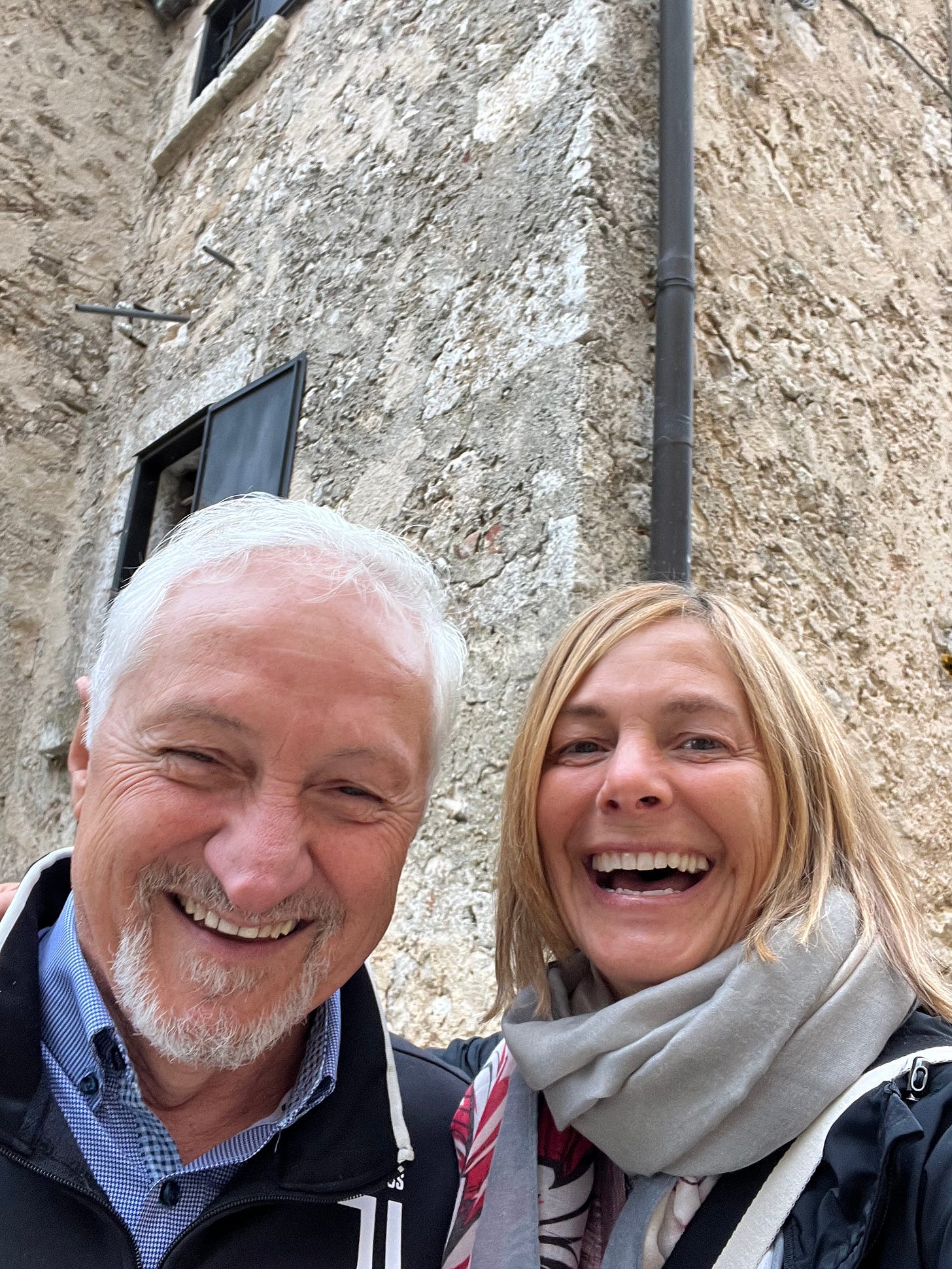Hello friends! This is the third and final installment in my Abruzzo series. Then I’ll stop talking about it. Until Calabria!
Outside of culinary circles, it’s a little known secret how Italians use a different type of yeast, lievito, a yeast for sweets, to bake their confections. I discovered this fact when my cousin, Viola Giuliani, sent me a recipe for celli ripieni (filled birds) cookies I consumed all over Abruzzo. The list called for lievito x dolci to make the celli, crescent-like cookies filled with homemade marmellata d’uva, cioccolato, buccia di arancia, maybe little nocino or black walnut liqueur.
While learning about the lievito was a side benefit, the experience of sharing a recipe grounded me. People have kept in touch over letters across the seas for a lot less than a packet of yeast!
My maternal grandmother had relinquished ties to her homeland, possibly due to her departure and scorning the family way, or because of the death of her husband later on. There’s no treasure trove of letters for me to peruse. What I do know or possess is another set of letters my mother exchanged 1980s and 90s with a cousin in Italy. Marianna “Anna” Buonvivere (meaning good life), the daughter of one of my mother’s aunts.
While dates on the letters demonstrate some lag time between, Anna wrote to Mom after the death of my grandmother, Raffaela, “I felt so much pain because she (my grandmother) was the only sister of my mother that was still living.” A life severed. My mother must have gotten in touch again, perhaps when her life, after having five kids, slowed to a manageable pace. She apologized for the lack of a letter in recent months.
In time, she kept up the correspondence with this cousin, and another (a former mayor of Spoltore, Giuseppe Appagnini) through the interpretive services of a woman named Lilliana di Donato, who also hailed from the same region as my mother’s parents, and now lived in Lorain.
In closing the final letter, Anne Buonvivere, whose sister was killed when stepping on a landmine in the mountains near Chieti, noted she was saddened because she had not heard from my mother in a while. Anna had visited the U.S., but since my mother had not written back, they never met up. Instead, their other-wordly encounter occurred through me and the fortitude of our guide, as we sought out Anna’s gravesite at the cimitario. As was custom, a youthful photo displayed on a headstone matched that of the only photo I had of Anna. It was the closest I came to a corporeal connection.
At present, I find myself in a similar correspondence situation. Communicating with second cousins (great nieces of Giuseppe). Wanting to find a way to stay connected. To belong. To make our lives count not just in conversations across our sidewalks and our days, but across continents and time. In penning a letter home while riding a train for his first trip through Italy, my father wrote, “It is dark now and we can see only the lights of the towns near train stations.” This going back and forth, these missives, are those train station towns, awakening the glow inside of us.
“The real disconnect is between the first and second or third generation (immigrants). We’re not interested in just survival anymore. We’re interested in meaning.” writes Min Jin Lee, a Korean-American author.
Everywhere I traveled in Abruzzo, people I met were seeking the same thing.
Everyone had a cugino, or cousin, they wanted to talk about. And for whatever reason, they were in the least suspecting place of Ohio. Or in proximity to, including near northeastern Ohio, Cleveland, Pittsburgh, and Steubenville.
The first instance was my own connection between Spoltore, Abruzzo and Ohio, and my newly discovered second cousins, as well as the previous ones known about through correspondence with my mother.
The Italians who arrived in the United States in the early 1900’s came for jobs in the coal mines, steel mills, and railroads. They came for work, for freedom, and for families back home who didn’t want to be forgotten.
I was reminded of that after a day of hiking around the Grand Maiella to the eremo (hermitage) di San Bartolomeo. We bed down for the night at Agriturismo Pietrantica (ancient stone), operated by la proprietaria, Marisa, who was that warm aunt you want to swallow you up in her arms.
Along with Mark and myself, her homestead housed a group of yoginis (I did practice yoga in Italian) and two guys from Belgium who had been hiking together for 20 years. This season they hiked from board to board. Marisa welcomed us all to dinner by telling her origin story. One that included—Cleveland. I can still hear the word, three syllables in her beautiful tongue. Cle-ve-land. According to legend, Marisa wasn’t sure certain of her culinary skills. An agriturismo requires cooking all day long, for weeks and months at a time. Though winter is their slow season. When her father’s brother—from Cleveland—came to visit, she was assured her culinary skills were on par with the best cooks in the land. She could certainly succeed as the head of a agriturismo. I can back that up. Her uncle was right.
Marisa and I exchanged Facebook accounts and emails, and she insisted I someday contact her cousin in Pittsburgh. While I did find myself in that city the very next week, I ran out of time. However, I returned home to cook the meals in Marissa’s repertoire that night to remember and honor our connection. We have since emailed about cafe di orzo (barley coffee, served out in the fields) and an invite to visit me anytime.
We stayed in many rustic, isolated parts of the region. Several days later, we were to bed down in Rocca Calascio, in another agriturismo. We were out for a stroll getting to know the tiny town when older man, who seemed to be the only inhabitant (other than us and our host for the evening), peeked out his doorway. Anxious to test my language skills on any unsuspecting Italian, we struck up a conversation. It turned out he had a relation from Ohio. A professor, perhaps. It wasn’t clear. Not more than ten minutes later, that person arrived. We began our conversation in Italian, until the friend said, “Hinkley.” “I know Hinkley,” I shouted. Anyone who grew up in NE Ohio in the 80’s knew Hinkley. We’d drive there from Amherst to see the buzzards roost during early spring weekends. He lived in Hinkley and frequented Little Italy in Cleveland, only not during the Feast of the Assumption. His family was from nearby Sulmona in Abruzzo, and he returned to visit every year. A man after my own heart.
The NE Ohio / SW corner of PA connection continued to astound me. I wished there was a name for that happenstance of zeroing in on Italians with Ohio connections, or sensing Ohioans with Italian connections. Writer Dawn Powell once said, “All Americans come from Ohio, if only briefly.” Perhaps there’s a version of “All Italians have a connection to Ohio.” Mark says I can walk into any room and I’ll find the Italian everytime. An app for that would be nice too.
It’s the precariousness of the connection more than anything else. The importance of understanding how easily threads fray. In the same way my Appalachian writer/poet friends write for the world to better understand their background, their values, their challenges, the way Blacks are reaching into the past to better comprehend the impact of their uprooting, this NE Ohio and western-southern Pennsylvania connection, and many other entities, does the same for me, for other Italians/Italian Americans.
It’s an enclave where we find safety. Where, when I’m a guest at a home in Mississippi visiting our kids, I will converse with the older man whose brown eyes resemble those of others I have loved. He’s from Uniontown, PA, and I will know instantly, “You’re Italian.” “How did you know?” he asks. My grandmother’s family grew up in the coal mines of Fayette County. His family might have been from Sicily, but the only thing I care about is his correct pronounciation of gnocchi.
Through additional research efforts, I linked up with another person in Spotlore, Vincenzo D’Anniballe. A man on a mission to create a sister city between Steubenville, Ohio and Spotlore. A fair number of Abruzzese found themselves in a city now famous for Dean Martin (that’s Dino Paul Crocetti to my mother). When Vincenzo and I traced our ancestors, I discovered my great-great grandmother sharing the same last name as Vincenzo, Annadomenica D’Anniballe.
Like many immigrants, my great grandfather, also named Vincenzo, was a bird of passage, traveling to the United States beginning in 1923, to work and collect funds to send back to his wife in Italy. By 1928, he had saved enough to bring his family to the United States. Steubenville was a stopping point, before settling in Salineville, heading off to Baltimore for work, and eventually succumbing to encephalitis. Who knows how many Ohio connections he had made in the intervening five years.
As the holidays progressed this year, I kept in touch with the Viola, sending her a photo of the celli ripieni, an easy task through Facebook with no need for translating. Over on WhatsApp, Vincenzo and I shared our concern on why the Steubenville mayor has not responded to his letters about a sister city project.
Given the knowledge of social media, my mother would have never lost touch with her family roots. Had she the ability to avail herself of the use of technology, I wonder if this connection over satellite to a world she never knew but felt in her bones, might have altered the path of her dementia. I’ll go on believing so, incentivizing me to maintain correspondence, keep up my Italian lessons, and never stop cooking Italian for the sake of my cognitive functioning—and for cousins everywhere. As if I needed another excuse.
As we close out this year, I wish for you that sense of belonging. Tell me where you found it or hope to find it—in your correspondence, digital or on paper, your passions, or your life.








Ellen-once our parents are gone there’s a greater imperative to dig at this. I hope you get there too! Or you and Mark can embark on that journey of finding your roots in the old “sod” as he says!
You certainly do. There’s something primal in us that recognizes one another.